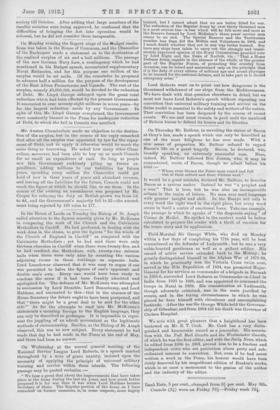In the House of Lords on Tuesday the Bishop of
St. Asaph called attention to the figures recently given by Mr. McKenua, in comparing the work of the Church and the Calviniatio Methodists in Cardiff. He had professed, in dealing with the work done in the slums, to give the figures "for the whole of the Church of England in Cardiff" as compared with the Calvinistic Methodists ; yet he had said there were only thirteen churches in Cardiff when there were twenty-five, and he had credited the Methodists with twenty-two mission halls when there were only nine by counting the various adjoining rooms in these buildings as separate halls. Lord Lansdowne observed that it was easy to argue if one was permitted to halve the figures of one's opponent and double one's own. Every one would have been ready to condone the error if it had been frankly admitted and apologized for. The defence of Mr. McKenna, was attempted in succession by Lord &ruble, Lord Beauchamp, and Lord Haldane, and amounted to this—that in the absence of the Home Secretary the debate ought to have been postponed, and that "there might be a great deal to be said for the other side." As for the attempts to read into Mr. McKenna's statements a meaning foreign to the English language, they can only be described as grotesque. It is impossible to repre- sent the juggling of an adroit accountant as the legitimate methods of statesmanship. Besides, as the Bishop of St. Asaph observed, this was no new subject. Every statement he had made that day he had made in the Times at the end of May, and there had been no answer.






















































 Previous page
Previous page